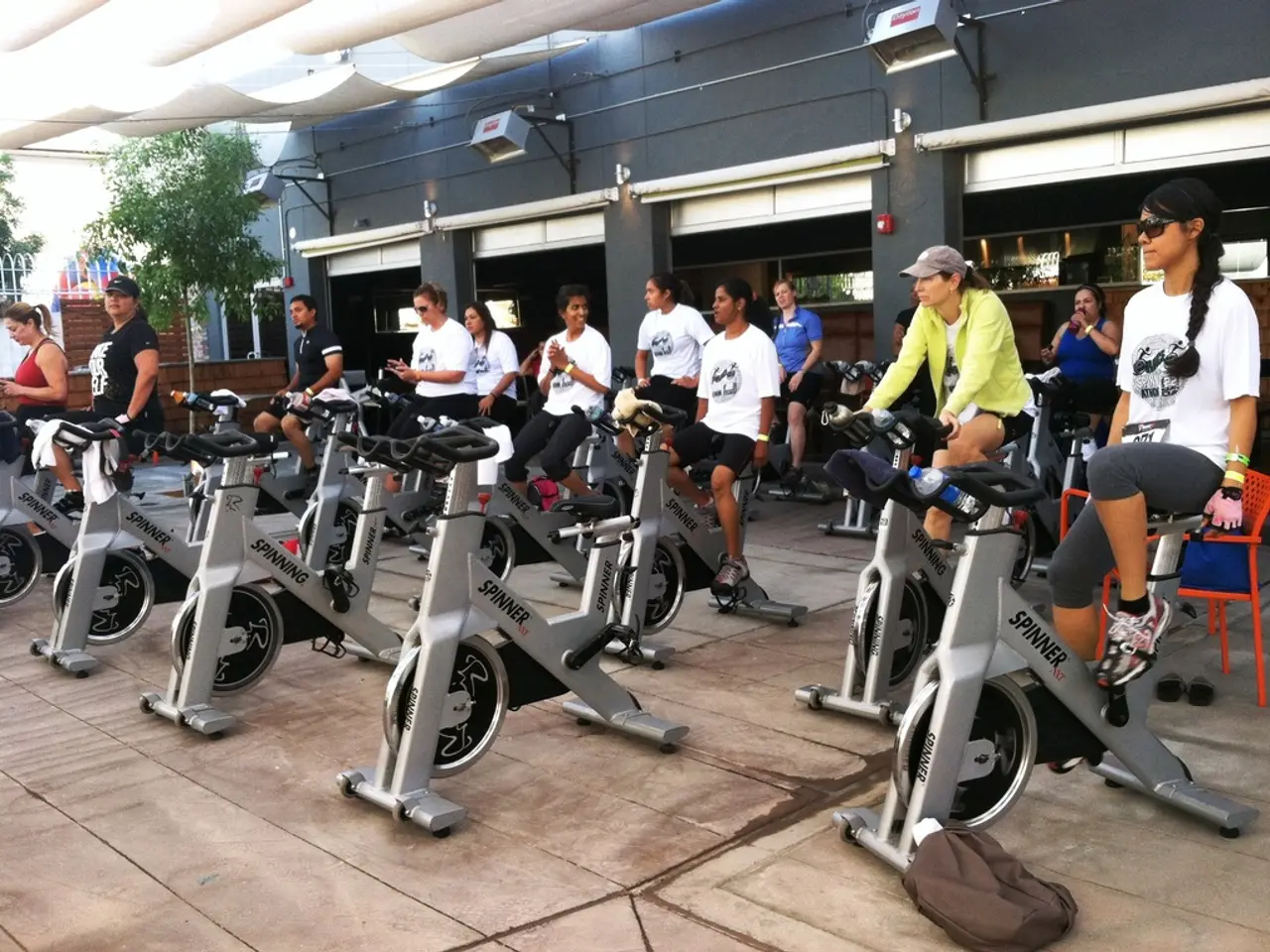Impact of Sleep on Fitness: The Role of Rest in Shaping Your Physical Aspirations
Sleep plays a crucial role in various aspects of our lives, and this is particularly true when it comes to fitness. Here's a breakdown of how sleep affects weight reduction, muscle healing, and athletic performance.
Darkness triggers the production of melatonin, the sleep hormone, so it's essential to use blackout curtains or an eye mask to eliminate light in the bedroom. Adequate sleep is vital for muscle repair and growth, as it stimulates the release of growth hormone during deep sleep, which is essential for muscle healing, especially for those engaged in strength training and endurance sports.
Poor sleep can disrupt hormones responsible for hunger control, metabolism, and fat storage. Leptin, a hormone that promotes satiety, falls when sleep is deprived, while ghrelin, a hormone that promotes hunger, increases, leading to overeating and excess weight gain. Elevated cortisol levels due to lack of sleep lead to increased appetite, stress-driven eating, and fat accumulation around the abdominal region.
Sleep duration significantly impacts weight reduction. Adequate sleep helps regulate metabolism and appetite, preventing weight gain linked to sleep loss. Poor sleep suppresses fat oxidation, making fat loss more difficult. Additionally, insufficient sleep reduces physical activity levels and motivation, lowering calorie expenditure, which impedes weight loss efforts.
For athletic performance, both the quantity and quality of sleep enhance key performance metrics such as sprint speed, accuracy, reaction time, endurance, and muscular power. Studies with athletes (basketball players, swimmers, tennis players) show extended sleep (around 9–10 hours) improves physical performance and mental well-being alongside reduced daytime fatigue. Sleep deprivation negatively affects reaction time, fine motor skills, problem-solving, and increases injury risk, thereby undermining training and competitive outcomes.
To ensure quality sleep, a supportive mattress and airy bedding can enhance comfort and minimize sleep interruptions. It's also beneficial to strive to sleep and wake up at the same time each day, including weekends, to naturally become sleepy and wake up refreshed, maximizing energy levels for exercise. Minimizing noise with earplugs, a fan, or a white noise machine can create a quiet sleep environment.
To maintain balanced hormones and support weight loss, it's recommended to strive for 7-9 hours of sleep every night, establish a regular sleep routine, avoid late-night snacking, alleviate stress before bedtime, restrict caffeine and screen use in the evening, and practice relaxation techniques. Lack of proper REM sleep can lead to mood fluctuations, irritability, and lack of motivation. Poor sleep reduces insulin sensitivity, making it difficult for the body to use glucose efficiently and leading to increased fat storage and a greater risk of weight gain. Insufficient sleep causes impaired glucose metabolism, leading to insulin resistance and type 2 diabetes, states that can counteract fitness progress.
Sleep assists in maintaining mental acuity, concentration, and decision-making capabilities, all crucial for following through on exercise programs and avoiding injuries. NREM (Non-Rapid Eye Movement) sleep supports muscle recovery, hunger control, and energy maintenance for peak performance. Having a regular sleep-wake schedule serves to regulate the body's internal clock (circadian rhythm) and enhance the quality of sleep and overall recovery.
In summary, sufficient sleep supports weight loss by optimizing metabolism and physical activity, aids muscle healing through hormonal pathways, and enhances athletic performance by improving strength, endurance, and cognitive function essential for fitness goal attainment.
- Using blackout curtains or an eye mask can help trigger the production of melatonin, the sleep hormone, promoting adequate sleep for muscle repair and growth.
- Adequate sleep stimulates the release of growth hormone during deep sleep, which is crucial for muscle healing, particularly for individuals engaged in strength training and endurance sports.
- Poor sleep can disrupt hormones responsible for hunger control, metabolism, and fat storage, leading to overeating, excess weight gain, and increased appetite.
- Sufficient sleep helps regulate metabolism and appetite, preventing weight gain linked to sleep loss and promoting effective weight reduction.
- For athletes, extended sleep (around 9–10 hours) can improve physical performance, mental well-being, and reduce daytime fatigue, and enhancing key metrics such as sprint speed, accuracy, reaction time, endurance, and muscular power.
- To ensure quality sleep, strive for a supportive mattress and airy bedding, a consistent sleep and wake schedule, and a quiet sleep environment by minimizing noise with earplugs, a fan, or a white noise machine.
- To maintain balanced hormones and support weight loss, it's recommended to strive for 7-9 hours of sleep every night, establish a regular sleep routine, avoid late-night snacking, manage stress before bedtime, limit caffeine and screen use in the evening, and practice relaxation techniques.
- Lack of proper REM sleep can lead to mood fluctuations, irritability, and lack of motivation, while insufficient sleep reduces insulin sensitivity, impairs glucose metabolism, and increases the risk of insulin resistance and type 2 diabetes.
- Sleep supports muscle recovery, hunger control, and energy maintenance for peak performance, and maintaining a regular sleep-wake schedule can regulate the body's internal clock (circadian rhythm) and enhance the quality of sleep and overall recovery.
- Sufficient sleep plays a crucial role in fitness goal attainment by optimizing metabolism, promoting muscle healing, and enhancing athletic performance through improving strength, endurance, and cognitive function.
- A healthy lifestyle that includes regular exercise, balanced nutrition (diet), adequate sleep, and stress management is integral to health-and-wellness, fitness-and-exercise, and weight-management.




